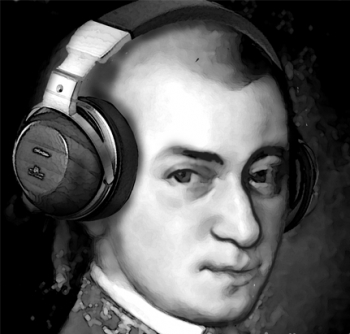Mozart Effect

Music is a very significant part of our life. We literally live on music. From our childhood, we could define what situation Tom & Jerry is in just by hearing that background music. As we grow up our music taste and our sense of music develop with our own perspective. Some chose music that reflects anger, while another choses a soothing touch of emotion in music. We often chose music according to our mood. We chose high beat trance songs when we are all pumped up, or chose soothing songs when we are low. We feel the music syncing down with our mood and let it make us feel what we want to feel. Little do we know, how music can affect our mood,thinking, let alone our Intelligence.
Psychoacoustics is a study of sound perception. it one of the major studies of the effects of music on the human mind. It basically describes how music format, starting from frequency and waveform till genre of music affects our mood, intelligence and even health. For example, any one can notice that violin tunes always feels close to heart. Its because the frequency of violin is close the resonance of our heart beat. Psychoacoustics branches out to many segments such as cognitive neuroscience, Franssen effect, Mozart effect, sound localization etc. However, one of the most interesting part of Psychoacoustics is the Mozart effect.
Mozart effect is a proven theory of music’s influence over intelligence. The term generated from an experiment that proved listening to Mozart Symphonies and melodies has a positive effect on Human Intelligence. If a child had been listening to mozart from early life, the child has more positive growth of intelligence than others. A set of research results that indicate that listening to Mozart's music may induce a short-term improvement on the performance of certain kinds of mental tasks known as "spatial-temporal reasoning and short term memory capacity. Popularized versions of the hypothesis, which suggest that "listening to Mozart makes you smarter". Another of set of experiment on lab rats show that, rats exposed to Mozart music improves their maze learning.
The April 2001 edition of Journal of the Royal Society of Medicine assessed the possible health benefits of the music of Mozart. John Jenkins played Sonata K.448 to patients with epilepsy and found a decrease in epileptiform activity. This created an impact on the whole music scene and changed the view of taking music as just a source of entertainment. In fact, on January 13, 1998, when Zell Miller, governor of Georgia, announced that his proposed state budget would include $105,000 a year to provide every child born in Georgia with a tape or CD of classical music. A separate incident of Budapest gypsy in 1875 is known for a violin symphony that caused the violinist to have a heart attack. In my personal way, Mozart music helps me have a sound sleep (Try Sonata in C major)
Music has been evaluated to see if it has other properties. The more we explore and know music, the more we learn about its attachment to our life. Maybe not for intelligence, not for medical use, but surely music brings an inner peace that nothing else can ever fill.
